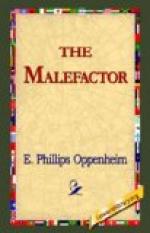“Ah!”
“Nevertheless,” she continued softy, “of one thing I am very sure. Every man is like every woman; he is vulnerable if you can discover the right spot and the right weapons. Mr. Aynesworth is not a woman’s man, but I fancy that he is ambitious. I thought that you might go and see him. He has rooms somewhere in Dorset Street.”
He rose to his feet. A glance at the clock reminded him of the hour.
“I will go,” he said. “I will do what I can. I think, dear,” he added, bending over her to say farewell, “that you should have been the man!”
She laughed softly.
“Am I such a failure as a woman, then?” she asked with a swift upward glance. “Don’t be foolish, Lumley. My woman will be here to dress me directly. You must really go away.”
He strode down the stairs with tingling pulses, and drove to the House, where his speech, a little florid in its rhetoric, and verbose as became the man, was nevertheless a great success.
“Quite a clever fellow, Barrington,” one of his acquaintances remarked, “when you get him away from his wife.”
A FORLORN HOPE
Aynesworth ceased tugging at the strap of his portmanteau, and rose slowly to his feet. A visitor had entered his rooms—apparently unannounced.
“I must apologize,” the newcomer said, “for my intrusion. Your housekeeper, I presume it was, whom I saw below, told me to come up.”
Aynesworth pushed forward a chair.
“Won’t you sit down?” he said. “I believe that I am addressing Mr. Lumley Barrington.”
Not altogether without embarrassment, Barrington seated himself. Something of his ordinary confidence of bearing and demeanor had certainly deserted him. His manner, too, was nervous. He had the air of being altogether ill at ease.
“I must apologize further, Mr. Aynesworth,” he continued, “for an apparently ill-timed visit. You are, I see, on the eve of a journey.”
“I am leaving for America tomorrow,” Aynesworth answered.
“With Sir Wingrave Seton, I presume?” Barrington remarked.
“Precisely,” Aynesworth answered.
Barrington hesitated for a moment. Aynesworth was civil, but inquiring. He felt himself very awkwardly placed.
“Mr. Aynesworth,” he said, “I must throw myself upon your consideration. You can possibly surmise the reason of my visit.”
Aynesworth shook his head.
“I am afraid,” he said, “that I must plead guilty to denseness—in this particular instance, at any rate. I am altogether at a loss to account for it.”
“You have had some conversation with my wife, I believe?”
“Yes. But—”
“Before you proceed, Mr. Aynesworth,” Barrington interrupted, “one word. You are aware that Sir Wingrave Seton is in possession of certain documents in which my wife is interested, which he refuses to give up?”




